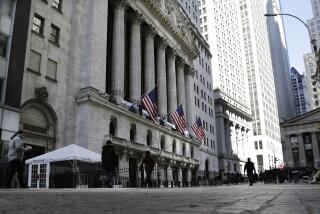Behind Japan’s Stable Market: Savings
- Share via
The news out of Japan’s stock market Tuesday was, once again, a story of stability as stocks regained the relatively mild losses they had suffered in reaction to last Friday’s market plunge in New York.
Meanwhile, chaos continued in New York, where the Dow Jones index was down more than 60 points in the morning, but recovered to close with a decline of 18.65 points. Even so, that marked a respite from the two previous sessions when stocks had risen about 88 points after falling 190.
So the contrast once more was between Tokyo stability and New York madness, just as it was in the October, 1987, worldwide market crash, when Tokyo declined 15% while New York fell 23%.
What’s really going on here? Is the Japanese market really more stable, and if so, why? Partial explanations abound, from reports that the Japanese government holds the market steady simply by asking brokers not to sell, to gloomy conjectures that the stock market mirrors the decline of America and the rise of Japan.
But the truth is more complex than that, involving strengths and weaknesses in the economies of both nations. And it’s a good idea to understand the differences because the two stock markets say a lot about where Japan and the United States will be going in the next decade. That’s likely to be a period that will see a weakening of market stability in Japan--although predictions are hazardous--and a strengthening in the United States.
Japan first. An executive of Nomura Securities in New York says the Tokyo market, on which 1,620 companies list their shares, is stable because “individuals still make up 30% to 40% of the transactions and this gives the market resilience, as you are seeing this week.” The executive, who asks that his name not be used in deference to Japanese custom that employees not speak publicly, also cites the abundant savings of individuals and businesses that provide “a lot of money around for investment.”
But others cite different practices that would be not only unusual in America but often illegal. Japanese banks and companies hold stock in each other that is not for trading or investment but is part of the business relationship between bank and company or supplier and customer. There are estimates that 70% of the shares of Japan’s major companies are held in such relationships, which means that only small percentages of a company’s outstanding stock ever trade.
And that means in turn that stock prices move on a relatively few shares changing hands, a fact that has given rise to another peculiarity of the Japanese market, called zaitech or financial engineering. Using zaitech, companies turn profits by trading part of their portfolios. Firms such as Matsushita Electric have made more than $2 billion in a single year from such trading, which accounts for 10% to 15% of the Tokyo market’s volume.
Foreigners, noting such practices, have predicted a collapse of the Tokyo market for years, but have looked silly when the collapse came instead in New York. What the foreigners have overlooked, says Lawrence Harris, finance professor at USC who is now visiting scholar at the New York Stock Exchange, is that Japan is a “relatively small country at the top.” He means that though it is a country of 120 million people, Japan’s industries and markets are dominated by a handful of firms--there are 93 member firms on the Tokyo Stock Exchange, and really only four major ones, compared to 596 member firms on the New York Stock Exchange.
As U.S. markets demonstrated in former ages when they were dominated by a few big financiers, control is easier when only handful of major players must be dealt with. But whether control can be maintained as Japanese society changes is another question. The most credible predictions currently, such as those made in a new book “The Sun Also Sets,” by Bill Emmott, an editor of The Economist magazine, is that the Japanese stock market will suffer a decline in the next decade, but perhaps not a crash.
So in Japan, the market’s stability may be overrated.
Meanwhile, U.S. markets, by contrast, are broad. Though Tokyo is now the world’s largest single market--at $3.9 trillion in total value of stocks, compared to $3 trillion for the New York Stock Exchange--the thousands of firms large and small traded over-the-counter in the United States make the total of its stocks and companies worth far more than those of Japan.
But the major U.S. market is not working as it should. Prices move in wider swings, frightening individual investors and threatening the market’s main purpose, which is to raise money for companies. In crises such as the present one, investment flees to larger companies and it becomes hard to raise financing for new business. “Price swings provide opportunity for traders, but no benefit for society,” says a seasoned market professional, investment banker Michael Tennenbaum of Bear, Stearns & Co.
So how should the markets be put right? By attacking the causes of price volatility--which are a lack of both savings and individual investors more than the computer trading that many people like to condemn. Like Japan’s, the U.S. markets need to have “a lot of money around for investment.”
Will they get it in the next decade? Could be that’s the way to bet. One straw in the wind: Nomura Securities, Japan’s largest brokerage house, is about to launch a major campaign in Japan for investing in U.S. stocks.
More to Read
Inside the business of entertainment
The Wide Shot brings you news, analysis and insights on everything from streaming wars to production — and what it all means for the future.
You may occasionally receive promotional content from the Los Angeles Times.










